Our call as Christians to support the women of Afghanistan. An advance look at a special report by Molly Thomas appearing in print in our Jan/Feb 2025 issue.
Imagine not being able to pray out loud in public, simply because you were born a female. That’s the reality in Afghanistan right now, arguably the worst country in the world to be a woman or a girl. Taliban rule means dark burqas line the streets of Kabul where every part of a woman’s body is viewed as a vice to society. Even a mesh screen must cover female eyes from being seen. If our eyes are a window to the soul, then Afghan women are not even afforded this simple dignity. Girls that once played sports are banned from fields and courts. Females are not even allowed to walk outside or go into the country’s national park without male supervision.
Most women can’t work in this new Afghanistan. They can’t speak, sing or even recite poetry in public. And while the Taliban has promised to bring back an Islamic version of schools for women and girls, it’s been more than three years and the ban is still in place. It’s no wonder there’s a mental health crisis in the country with rising rates of depression, anxiety and suicide. Women are being systematically erased from public life and the world is not talking about it.
My last year has been dedicated to telling these women’s stories. I received the Michener-Deacon Fellowship from Canada’s Governor General to look into the loss of school for women and girls. And while I knew the logistics to tell an ambitious story like this would be a challenge, I didn’t expect the apathy and lack of interest in Canada to be a bigger hill to climb.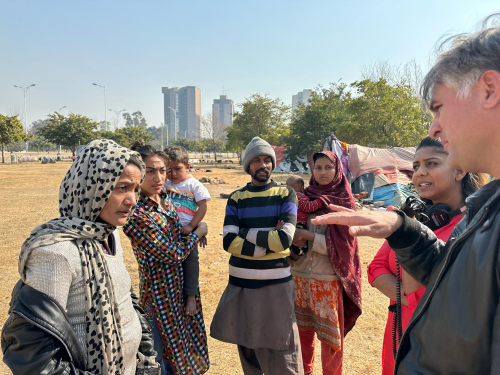
Photo caption: Meeting single mom Layla and her young family in a makeshift camp in Islamabad, Pakistan. They have been living in dire conditions for more than two years.
Afghanistan is not a strange, foreign land to Canada. It was our longest military mission in history with 158 Canadian soldiers losing their lives in combat against the Taliban, and more than 2,000 coming home injured. Whether naively or not, our men and women spent 14 years on the ground – our allies stayed even longer, helping pave the way for many basic human rights.
An entire generation of little girls grew up with hopes and dreams of impacting society beyond the kitchen. And yet, when I’ve approached mainstream newsrooms here in North America asking if they’d publish my reporting on this topic, there’s been an apathetic silence. The few editors who do write back say, “We’ve done that story before,” which in our business often translates to “Who cares?”
I'm deeply disturbed by this response when basic human rights are eroded for some of the world’s most vulnerable.
How I found myself interviewing Afghan women
Growing up as a brown child on the Prairies, I would cringe when my parents would say, “We’re going back to India to visit the family!” Despite our home state of Kerala being known as God’s own country, with breathtaking backwaters, marble floors in middle-class homes, and coconuts and mangoes flowing like milk and honey, I preferred life in a snowsuit, with -40° winters on the cold, quiet Prairies.
Sure, I wanted to see my loving grandparents who affectionately waited for us to get off the plane, but the tradeoff of sweating through my clothes and CrossFit-style squatting (with no toilet paper) over a hole you can’t afford to fall into didn’t make this my top pick for family vacations. Gender norms that went against every independent bone in my body only made it worse.
Did I mention slithering snakes, venomous spiders and black scorpions that somehow only seemed to greet my sister and I whenever we visited the family property? I was used to the warm comforts of a rather homogeneous, Caucasian culture. I wasn’t the girl ever jumping at the opportunity to visit the developing world – until God changed me.
I always knew I wanted to be a journalist. I loved meeting new friends, speaking in front of large audiences and finding out someone’s story. I imagined a life in broadcasting through rose-coloured glasses – the bright lights and TV cameras, the perfectly coiffed hair and manicured nails. I wanted to be seen and be in the spotlight.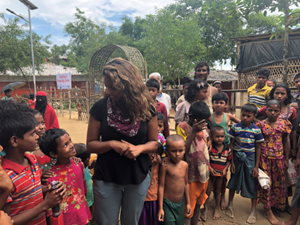
But when Jesus really got a hold of my heart in my early 20s, my perspective changed. He started spotlighting to me struggling groups of people around the world. As I was finishing my journalism degree, I heard a clear and distinct voice. “I’m going to take you around the world to tell stories of vulnerable people.”
What a wild idea, I thought as I laughed out loud. It’s quite a statement considering who I was and where I lived. Saskatchewan is not exactly the ideal place to catch an international flight. But my heart was also pounding because the message was crystal clear. I knew there was spiritual weight to it.
As my prayer life evolved, so did the stories God brought my way. From a 72-hour turnaround trip to meet Haitian orphans, to finding Iraqi families whose children were gunned down by ISIS, to farmers on the brink of famine in Somalia, it’s been the most heartbreaking yet fascinating journey to live out that promise. My 15-year career is marked by moments only God could create. He has paved the way to even the most impossible places, and I have painstakingly and annoyingly hounded news editors at local, provincial, national and international stations to get these stories on the air.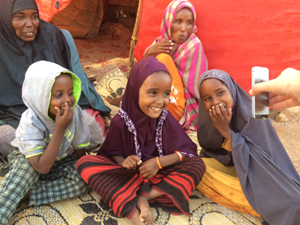
Can you imagine a young girl who threw a tantrum every trip to the developing world now fighting for every opportunity to be on the ground? That’s proof enough to my selfish past that God really churns us out and makes us new.
I’ve now had the privilege and responsibility of reporting from 12 foreign countries, mostly fragile contexts, and my heart burns for the injustices I’ve seen. My unfortunate takeaway is that women and young girls are disproportionately marginalized around the world. –MT
Top photo caption: Making friends with Rohingya refugees in Bangladesh.
Bottom photo caption: Somali children seeing their photo taken for the first time.
Why we should care
So why should we care as Christians? Why should we repeat our calls for justice for the women of Afghanistan?
Listen, the world has a lot going on. Extreme economic uncertainty, polarizing political elections, chaos inflicted from climate change, and long, unbated wars that never seem to end. And yet Afghanistan stands out to me above the fray. Why?
First, these draconian laws only apply to women, a continually marginalized group Jesus fought for even in His day. Remember the traditional Jewish prayer where men thanked God they were not born a woman? Jesus overrides culture by travelling with women in His ministry, appearing first to females after His resurrection and using church leaders like Phoebe and Priscilla to spread the Good News. In John 4 we learn about the woman at the well. And even though she was an outcast in her community, Jesus extends a hand of mercy and grace to set her free.
When we think of the women of Afghanistan feeling trapped and alone, depressed and forgotten, we know that “The Lord is close to the brokenhearted and saves those who are crushed in spirit.”
Beyond our spiritual command to pursue justice, we must also consider this is the only country in the world where women and girls are not allowed to go to school. We sometimes take school for granted, often complaining or showing up late to class without a second thought. But school is not just a pastime or a hobby. It is a basic human right.
The UN further describes education as a “passport to human development that opens doors and expands opportunities and freedoms.” So when you close those doors, you also shut down dreams. The dreams of Afghan girls have been shattered for years.
I had the opportunity to get on the ground in South Asia for my three-part podcast series Dear Taliban which focuses on the lives of three resilient, young Afghan women. They’re as different and diverse as Afghanistan itself, a country of 42 million representing a wide range of ethnic backgrounds.
Meet Haya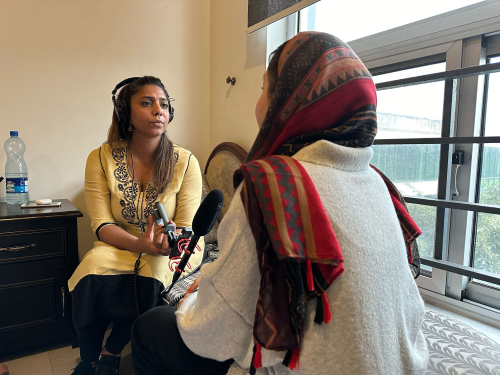
One of the young women I met is Haya. One glance at her and you know she’s from the big city – bright, beautiful headscarves accompany her chic Western wear. Her bubbly confidence makes her seem much older than she is – she’s 21 going on 40. Did I mention her English is impeccable?
Photo caption: Interviewing Haya in her temporary home in Islamabad. We are concealing her face for her safety. Photo credit: Riley Nimens
She used to be a full-time university student and TV host in Kabul, only to have her schooling and dream job stripped away when the Taliban took over her country. Because of her high-profile job, her family fled to Pakistan in 2021.
“It’s always us. It’s always women, it’s always girls that are losing one way or another,” Haya frustratedly tells me from her temporary apartment.
She comes from a middle-class home where her father and mother both encouraged her to go to school. Most Afghan girls didn’t grow up like this. Even though Afghanistan saw a tenfold increase in attendance for all primary to tertiary students from 2001 to 2020, the majority of school-aged girls were not in the classroom.
Some ultraconservative communities believe Afghan women should never have a public role in society, but many others, Haya tells me, were scared their daughters would be harmed during the war – even walking to school could be dangerous.
Haya’s family knew not sending their children to school was an even bigger risk.
“My father is very different because he has an open mind, because he is educated,” Haya says. She’s now worried the ban on female education will also damage young male minds. “Uneducated men are not open-minded men, and nonopen-minded men are a tragedy, a nightmare,” she says.
Haya has applied to come to Canada, though it’s been more than three years. She desperately hopes she can get back to the classroom.
“I need to continue my education or I'm going to lose my mind,” she says. “I feel like I'm getting older day by day. And people my age, they have done their education, they're doing a job, they're happy in their life. And I'm stuck in this place.”
Meet Merwa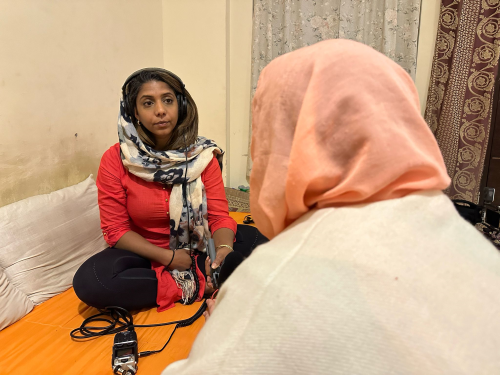
Also stuck is 20-year-old Merwa. Unlike self-assured, confident Haya, Merwa is shy and nervous around strangers. She grew up in an ultratraditional Pashtun household and never went anywhere in Afghanistan without her father or brothers. Her family set her up to marry a man almost twice her age when she was just a teenager.
Photo caption: Meeting Merwa in her small apartment where she lives alone. We are concealing her identity for her safety. Photo credit: Riley Nimens
“That's my family choice,” she says. “Because there is no boy or girl – especially girls – who are allowed in Afghanistan to get a marriage by love.”
That choice wrought havoc in her life. When Kabul fell Merwa was already engaged. Because Merwa’s brother had worked as a cleaner for Canada, her family was issued a special visa to get out of Afghanistan. But her fiancé wouldn’t let Merwa go to Canada. And so she had to stay behind.
The years that followed were horrific. Separated from her immediate family, she had nowhere to turn when her husband started beating her. She shows me the scars on her forehead. He finally divorced her a few years later, and Merwa fled to Pakistan to get away from him and his family.
“My life is damaged,” she tells me through tears. “I don't want to be alive. So I try three times for suicide.”
She tells me about the pills she pushes down in those moments of despair. And I believe her. This girl is so hopeless, it’s hard for me and my producer to hold back our tears.
I leave, reassuring her she has worth and value, trusting the Holy Spirit will linger much longer than I can. Here in Canada I’m on the hunt for a compassionate church who will privately sponsor Merwa into Canada so she can finally be reunited with her family.
As an apathetic world races on and asks, “Who cares?” I believe the Church has a higher calling to protect these girls. We must be the warriors who cry out for justice in a world that has a very short attention span. We must look beyond the headlines of the day for long-term solutions to help the most vulnerable. And we must be men and women who pray for our broken earth to look more like His Kingdom.
I’m encouraged to know the majority of refugee Sponsorship Agreement Holders in Canada are churches or parachurch organizations. In Toronto alone, 130 Afghan families have been welcomed by the Church community into our country since the Taliban takeover of 2021. What a witness we can be when we live out our calling “to act justly, love mercy and walk humbly with our God.” Might we have that sense of urgency for one more Afghan girl?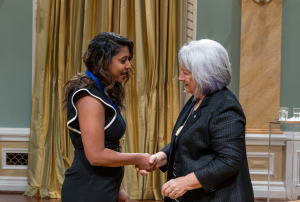
Molly Thomas, MA in global affairs, is a broadcaster who has worked for all three major Canadian TV networks. Some names in this piece have been changed for protection purposes. Her reporting was funded in part by the Michener-Deacon Fellowship (photo shows her receiving the 2023 award from the Rt Hon Mary Simon, Governor General of Canada. Photo credit: Rideau Hall).